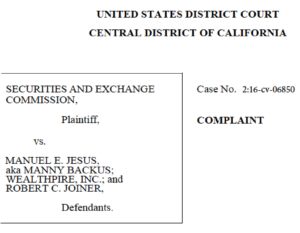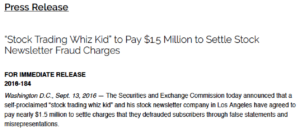Types Of SEC Cases: Investment Newsletter Fraud
SEC Fines Company For Investment Newsletter Fraud
On September 13, 2016, the U.S. Securities and Exchange Commission (“SEC”) filed a complaint in court charging a company named Wealthpire, Inc., and its owner with investment newsletter fraud. That same day, the SEC issued a press release announcing that Wealthpire and its owner agreed to settle the investment newsletter fraud charges and other charges for approximately $1.5 million. According to the SEC, Wealthpire deceived its paying and potential subscribers by providing false information regarding stock trades and performance.False Advertising

The SEC’s Complaint
Fraudulent Trading Disclosures
The SEC also alleged that Wealthpire furthered the investment newsletter fraud by lying to its subscribers about who was making the investments and in what securities. As part of the investment newsletter fraud, Wealthpire recommended one set of investment trades to its subscribers. At the same time, through e-mail alerts, chat rooms, or other promotional activities, Jesus/Backus was trading or investing in different securities. Furthermore, Jesus often was not even the trader making the recommendations. According to the SEC, Wealthpire paid a third individual, Robert C. Joiner, to pose as Backus for one of its alert services, to make the stock picks for that “alert service”, and to participate in chat room sessions pretending to be Backus. In those chat room sessions, using the Backus alias, Joiner claimed to be buying and selling certain stocks when in truth Backus/Jesus was not actually doing so.
The SEC’s press release
Settlement: Disgorgement, Interest And Penalties
The SEC settled the case with Jesus and Wealthpire for the following:- $1,135,145 in disgorgement;
- $112,902 in interest; and
- $235,000 in penalties paid by Jesus a/k/a Backus.
Whistleblowers Can Report An Investment Newsletter Fraud To The SEC
This case illustrates some types of misconduct that could give rise to SEC whistleblower cases if reported to the Commission through the SEC whistleblower program. However, the SEC has not made any public statement as to whether this case was itself an actual SEC whistleblower case. The SEC Office of the Whistleblower posts Notices of Covered Action (“NoCA”) for Commission actions where a final judgment or order results in monetary sanctions exceeding $1 million. But the SEC does not disclose if a particular Enforcement action on the NoCA list was brought as the result of an SEC whistleblower case, tip, complaint, or referral being filed with the Commission.Additional Information
For more information about investment newsletter frauds, click on the links below:-
- The SEC’s Press Release announcing the settlement in the Wealthpire case. (External link to the SEC’s website.)
-
- The SEC’s Complaint in SEC v. Manuel E. Jesus, aka Manny Backus, et al. (External link to the SEC’s website.)







